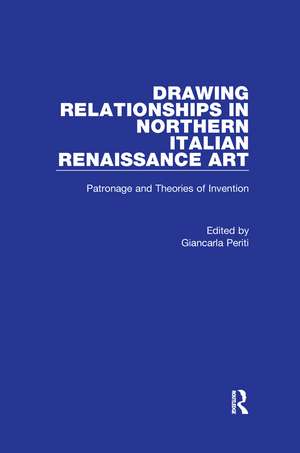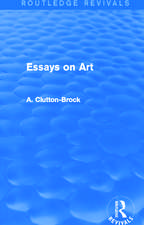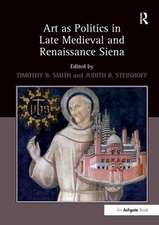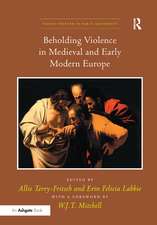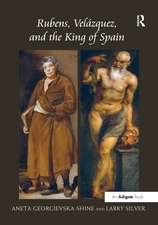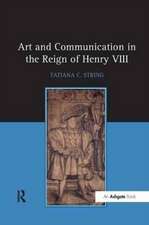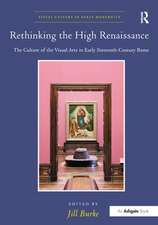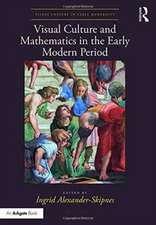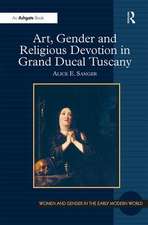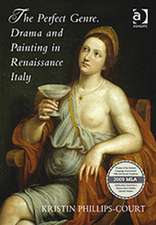Drawing Relationships in Northern Italian Renaissance Art: Patronage and Theories of Invention
Editat de Giancarla Peritien Limba Engleză Paperback – 26 oct 2016
Preț: 489.26 lei
Nou
Puncte Express: 734
Preț estimativ în valută:
93.62€ • 97.56$ • 77.52£
93.62€ • 97.56$ • 77.52£
Carte tipărită la comandă
Livrare economică 03-17 aprilie
Preluare comenzi: 021 569.72.76
Specificații
ISBN-13: 9781138272965
ISBN-10: 1138272965
Pagini: 252
Dimensiuni: 156 x 234 x 13 mm
Greutate: 0.45 kg
Ediția:1
Editura: Taylor & Francis
Colecția Routledge
Locul publicării:Oxford, United Kingdom
ISBN-10: 1138272965
Pagini: 252
Dimensiuni: 156 x 234 x 13 mm
Greutate: 0.45 kg
Ediția:1
Editura: Taylor & Francis
Colecția Routledge
Locul publicării:Oxford, United Kingdom
Cuprins
Contents: Preface; Introduction, Charles Dempsey; The Tomb of the Ancestors in the Tempio Malatestiano and the Temple of Fame in the poetry of Basinio da Parma, Stanko Kokole; Emilian Seicento art literature and the transition from 15th- to 16th-century art, Giovanna Perini; Amico's friends: Aspertini and the Confraternita del Buon Gesù in Bologna, Marzia Faietti; A misunderstood iconography: Girolamo Genga's altarpiece for S. Agostino in Cesena, Alessandra Galizzi Kroegel; Pordenone's Passion frescoes in Cremona Cathedral: an incitement to piety, Carolyn Smyth; The studiolo of Alberto Pio da Carpi, Alessandra Sarchi; Enigmatic beauty: Correggio's Camera di San Paolo, Giancarla Periti; Reconsidering Parmigianino's Camerino for Paola Gonzaga at Fontanellato, Mary Vaccaro; Bibliography; Index.
Recenzii
'... a group of lively, stimulating essays which fulfil the aims of the collection. They are contributions that will appeal primarily to a scholarly art-historical readership, but the new and interdisciplinary approaches adopted will make the collection one that will be recommended reading for, and of interest to, students of Italian Renaissance art as well as to academics.' Prof. Francis Ames-Lewis, Birkbeck College, University of London, UK
'Ashgate is to be commended for publishing books of this kind...' CAA Reviews
'What these essays seem to achieve, taken together, is a multi-faceted celebration of the art of a region that ultimately challenged the hegemony of Roman, Toscan and even Venetian painting in the sixteenth century.' Gabriele Neher, The Art Book
'Ashgate is to be commended for publishing books of this kind...' CAA Reviews
'What these essays seem to achieve, taken together, is a multi-faceted celebration of the art of a region that ultimately challenged the hegemony of Roman, Toscan and even Venetian painting in the sixteenth century.' Gabriele Neher, The Art Book
Descriere
Vasari's celebration of the art of the central Italian cities of Florence, Rome and Venice, has long left in shadow the art of northern Italy. The economic and historical decline of the region compounded this effect with the dispersal of the treasures of the Farnese to Naples, the Este to Dresden and the Gonzaga to Madrid and Paris. Each chapter in this volume celebrates a stunning work from the region, among them Correggio's famed Camera di San Paolo in Parma, Parmigianino's camerino in the Rocca Sanvitale near Parma, the studiolo of Alberto Pio at Carpi, and the Tomb of the Ancestors in the Tempio Malatestiano in Rimini. The volume as a whole offers fascinating insights into the tussle between the maniera moderna and the maniera devota in the first half of the sixteenth century, when the unity between the elegance and beauty of art and its religious significance came under debate. Around the year 1550, when Michelangelo's Last Judgement came under attack for impiety and lasciviousness and the reformists called for an art that would invoke in the viewer a devotional response that identified manifestations of the divine with human feelings and emotions. In northern Italy, it was on the foundation laid by Correggio, with his tenderness and ability to evoke the softness of living flesh, that the Carracci brothers built their reform of painting.
